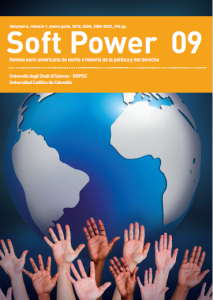Resumo
The deep crisis of the representation regime open to the winning instance of presenting the dynamics of reality in an absolute immanence: the neoliberal discourse is capable of producing subjectivations adapted to the global transformations of capitalism. But it is also a way of representing the ontology of the present, highlighting the individualistic and deconstructed fragmentation that makes it governable in the neoliberal modus. Governance is held together with the incoherent fragmentation as its presupposition. Since the Eighties and under the pressure of euphoric globalization, neoliberal governmentality manages the double instance of government and self-government through a functional, operational organization, based on an unlimited inclusiveness of principle that is however regulated and made selective through the universal law of competition.

Referências
Agamben, G. (1995). Homo sacer. Il potere sovrano e la nuda vita. Turin: Einaudi.
Arienzo, A. (2007). Governo, governamentalità, governance. Riflessioni sul neo-liberalismo contemporaneo. In A. Vinale (Ed.), Biopolitica e democrazia (pp. 255-277). Milan: Mimesis.
Bair, J. (ed.) (2009). Frontiers of Commodity Chain Research. Stanford: Stanford U. P.
Bazzicalupo, L. (2016, march). Economy as logic of government. Paragraph, 39(1), pp. 36-48.
Boltanski, L. & Chiapello, E. (1999). Le nouvel esprit du capitalism. Paris: Gallimard.
Burchell, G. (1996). Liberal Government and Techniques of the Self. In A. Barry, T. Osborne & N. Rose (Eds.), Foucault and Political Reason. Liberalism, neo-liberalism and rationalities of government (pp. 19-36). London: UCL Press.
Chicchi, F. (2012). Soggettività smarrita. Sulle retoriche del capitalismo contemporaneo. Milan: Bruno Mondadori.
Deleuze, G. (1986). Le plie, Leibniz et le baroque. Paris: Minuit.
Deleuze, G. (1990). Postscriptum sur les sociétés de contrôle. In Pourparlers (pp. 240-247). Paris: Minuit.
Levitt, D. & Dubner, S. J. (2006). Freakonomics. Calculating the Uncalculable. Milan: Sperling & Kupfer.
Mezzadra, S. & Neilson, B. (2013). Border as method, or, the Multiplication of Labour. Durham: Duke University Press.
Miller, P. & Rose, N. (2008). Governing the Present: Administering Economic, Social and Personal Life. London: Polity Press.
Ong, A. (2006). Neoliberalism as Exception: mutations in Citizenship and Sovereignty. Durham and London: Duke University Press.
Tucci, A. (2013). Disaggregazioni. Forme e spazi di governance. Milan: Mimesis.







